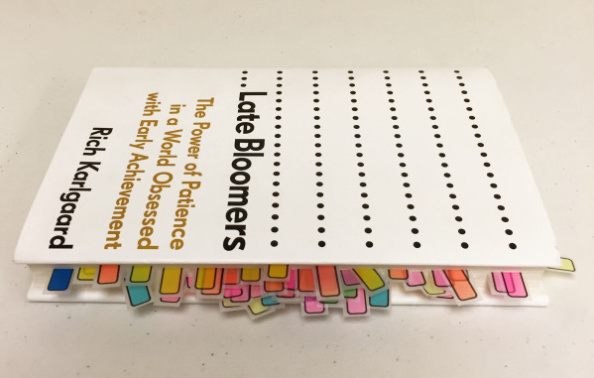When I first published my Seeing My Time® books back in 2010, it was exceedingly rare to ever read or hear a reference to executive functions in the popular press. These days, the term “executive function” is a widely used explanation for the struggle that so many people face. As a time-management educator, I am always on the lookout for new information that might be useful to my clients.
A few weeks ago, I read a Wall Street Journal article on the topic of late bloomers. In it, Rich Karlgaard discusses the developmental aspects of the prefrontal cortex as an underpinning of his new book: Late Bloomers – The Power of Patience in a World Obsessed with Early Achievement. This topic is extremely relevant to my work, since we know that the executive functions of the brain can develop later in life – even into our twenties and thirties. I purchased the book and began reading it right away.
Why do We Expect Young People to be Early Achievers?
Today, there is SO much pressure on our young people to perform and produce at a rate that simply exceeds their brain’s developmental capacity. I see it every day with my Seeing My Time private sessions clients.
 For example, a talented and hardworking high school student wanted to take an environmental science course next year because she thought it would be interesting. The school counselor advised her that the class wouldn’t look good on her transcripts. Instead, she should take a serious science class and some AP or honors courses so that the “GOOD” colleges would think she is a worthy candidate. While this young woman is getting A’s, (and acting as the star role in local theater productions), her mother’s biggest time management concern was the student’s excessively long showers. What ideas did I have to change that? When I suggested that her daughter might be hiding in the shower to decompress from the pressures of her life – a light bulb went on in the mother’s eyes.
For example, a talented and hardworking high school student wanted to take an environmental science course next year because she thought it would be interesting. The school counselor advised her that the class wouldn’t look good on her transcripts. Instead, she should take a serious science class and some AP or honors courses so that the “GOOD” colleges would think she is a worthy candidate. While this young woman is getting A’s, (and acting as the star role in local theater productions), her mother’s biggest time management concern was the student’s excessively long showers. What ideas did I have to change that? When I suggested that her daughter might be hiding in the shower to decompress from the pressures of her life – a light bulb went on in the mother’s eyes.
I have SO MANY stories like this. No parent is immune to feelings of anxiety when it comes to their child’s success, especially in our current fast-paced world.
How this Book Affected Me
In his book, Karlgaard lays out carefully reasoned explanations, based on neuroscience and research, for why the pressure for early achievement has risen to such heights. He makes a strong case for the values of patience, curiosity, and varied experiences – all characteristics inherent in being a “late bloomer.”
Reading through the book, I kept flagging page after page. He validated so much of what I teach in Seeing My Time. At the end of the book, I burst into tears.

The last 10 years my life have been devoted to the issues of executive function challenges and building a small business that reaches the needs of people around the world. Working with young people providing knowledge and tools for them to be more purposeful in their lives, I often wistfully say, “Just think what I could have accomplished if I had this information when I was your age.” You see, at almost 66, I have often described myself as a “late bloomer.” Here’s some of what I was up to before finding my true calling.
My Story as a Late Bloomer
I bounced around a lot between 18 and 30, accumulating something like 13 address in five states. Despite graduating high school with very good grades, college didn’t start off so well. I failed two or three of my first quarter classes. My second term went marginally better, which may not be saying much because there were no grades at my institution, just pass/fail.
I didn’t feel ready to take full advantage of college until my graduation year. I wanted to start over. And despite graduating with a teaching certificate, I hadn’t a clue how to find a teaching job.
My work experience didn’t have much of a common thread: I was an art teacher in a school for the deaf, recruiter for Girl Scout leaders in the Hispanic community, a nanny, a seasonal US Park Service ranger, a Baskin-Robbins worker, house cleaner, an insurance company claims analyst and a fourth-grade teacher.
Struggling to keep a roof over my head, I faced major life challenges, including putting my life on hold to care for my mother more than once. Eventually she died of breast cancer when I was 21. I had a seven-year relationship that only ended (in my mind) when I found out that he had married someone else!
And yet, I also did a lot of exploring.
At different times I traveled in Europe, studied art history, sang 15th century music in cathedrals, ate artisanal foods (LONG before it became a thing), and lived in a convent while studying Spanish. I drove down the Alaska-Canadian Highway before it was completely paved, started a quilt that I finished 12 years later, learned how to do a tune-up on my 1971 VW Super Beetle, and took a wood working class. I still have the bookcase I built!
In short, I lived.

While certainly not boring, this life wasn’t easy, and I suffered with poor self-esteem. Prior to reading Karlgaard’s book, I would have said that my non-linear life was simply a classic example of a person with executive function deficits. And while this is true, it was a person who just needed more time to find my life’s purpose.
Karlgaard’s book helped me reframe my life in a more positive way. He celebrates the accomplishments of late bloomers and their value to society. He even provides research on the positive aspects of aging for the brain. We gain WISDOM as we age! All that meandering in my early life gave me experiences that are the foundation of the wisdom I now share. People are willing pay me money to have access to that wisdom! Facing the negative aspects of my aging brain, I still have value in this youth-centric, fast-paced world.
That’s why I burst into tears. This book gave me hope that I can still continue to bloom, and help others bloom, under their own terms, to build their own purposeful lives.
If you are suffering anxiety with a slow blooming child, or a suddenly struggling early achiever, I highly recommend Karlgaard’s book, Late Bloomers. It is also wonderful for those adults who identify as a late bloomer. I invite you to focus on one word in his subtitle: Patience.
Little by little…we each bloom.


OMG I am a 32 year who graduated in art education and is certified in regular Ed. I suffered through 5 tramatic years teaching in New Orleans schools. I recently quite teaching largely bc my executive functioning skills were terrible (but there were other important struggles) I feel like such a failure. But reading your experiences and wisdom has helped me tremendously! Thank you for all that you share! You truly have a growth mindset (another concept that has gotten me through tough times!). When I read your words I feel so heard. Again thanks and hope this makes you smile! You give me hope!
Maria, Your comments did make me smile and warmed my heart. Keep that growth mind set and do the work to improve your EF skills. Support your brain’s weak areas by using external supports like clocks and paper calendars and other things I have written about in previous blogs. From my vantage point you are still a young one with lots of time to bloom! I have tremendous hope for you. And don’t beat yourself up about leaving teaching (for now?). It is a demanding tough job. You learned a lot in that experience that will come to play down the line. Be gentle with yourself. My worst reoccurring nightmares are incompetent teacher dreams! They STILL haunt me! You will bloom. Little by little – Feel the hug.
Great post, Marydee! I shared on Facebook as I think your post and this book make valid points that many families could benefit from learning.
Thanks Shawn! This is so important to share with parents and young people.